Product Resources
Product Resources
Electron microscopy software
The TEAM EDS 2.0 AnalysisSystem software from Edax Inc. is designed for use with electron microscopes and reportedly streamlines analysis and reporting workflow, boosts user productivity, reduces analysis time, and minimizes error potential. According to the company, the software can compare and review multiple maps simultaneously, extract spectra from the area of interest using a histogram feature, and handle up to 120,000 counts/s. Edax, Inc., Mahwah, NJ;
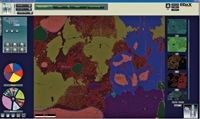
Dichroic shortpass filters
Edmund Optics' Techspec dichroic shortpass filters are designed for a 45° angle of incidence. According to the company, light rejected by the filter is reflected at 90°. The filters reportedly feature low polarization dependence, broad spectral ranges, and a precision fused-silica substrate. The filters can be used in fluorescence applications and as spectral beamsplitters. Edmund Optics, Barrington, NJ;

Microwave digestion system
Milestone's UltraWAVE benchtop microwave digestion system features the company's Single Reaction Chamber design. According to the company, the system uses disposable glass vials instead of traditional digestion vessels, reducing digestion acid volume and lowering digestion blanks. Milestone, Shelton, CT;
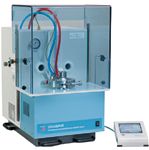
EDXRF spectrometer
The EDX-LE energy dispersive X-ray fluorescence spectrometer from Shimadzu is designed for screening elements regulated by RoHS/EL V directives. According to the company, the spectrometer has automated analysis functions and a detector that does not require liquid nitrogen. Users can customize the functions according to the management method. According to the company, threshold values can be set for each material or element, and the screening judgment can be changed depending on the input method used for threshold values. Shimadzu Scientific Instruments Inc., Columbia, MD;
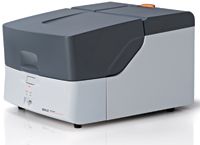
XRF spectrometers
PANalytical's Epsilon 3 benchtop XRF spectrometers are designed to match and in some cases surpass the performance of WDXRF spectrometers. The spectrometers reportedly have a power envelope of up to 50 kV and 3 mA. According to the company, these systems are equipped with silicon-drift detectors with a count rate capacity of greater than 200,000 cps and a count rate independent resolution better than 135 eV. PANalytical, Westborough, MA;
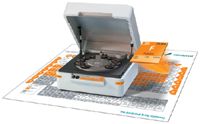
AA spectrometers
The PinAAcle atomic absorption spectrometers from PerkinElmer are available with a variety of configurations and capabilities, including flame only, furnace only, or stacked designs featuring both; flame, furnace, flow injection, FIAS-furnace, and mercury/hydride capabilities on a single instrument; and with deuterium or longitudinal Zeeman background correction. The spectrometers include the company's TubeView color furnace camera and WinLab32 software. PerkinElmer, Waltham, MA;
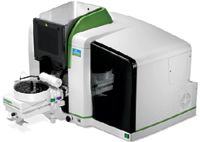
Industrial gas system
Thermo Fisher's Antaris industrial gas system is designed to provide scanning speeds as high as 5 Hz at 0.5-cm-1 resolution. According to the company, the FT-IR-based analyzer is capable of monitoring dozens of gases simultaneously while providing multicomponent gas analysis. Thermo Fisher Scientific, Madison, WI;
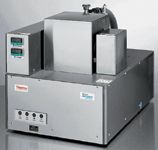
Lab-grade preconfigured Raman spectrometer
B&W Tek's Glacier T high resolution TE cooled CCD array spectrometer for Raman spectroscopy applications is designed for laboratory performance. The spectrometer reportedly measures less than 8 in. × 4 in. × 4 in. According to the company, the spectrometer's cooling system allows the signal to be integrated for sufficient time to accumulate measurable signals for detection, without being saturated with dark noise. B&W Tek, Newark, DE;
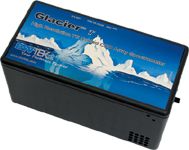
ATR accessory
Pike Technologies' GladiATR single reflection diamond ATR accessory reportedly has expanded temperature control options that can be configured for heating to temperatures as high as 300 °C. According to the company, the accessory can be used for high-temperature kinetic or material degradation studies. The accessory reportedly operates with the company's software and comprises reflective optics and a monolithic diamond for high throughput across the full mid-IR and far-IR spectral ranges. Pike Technologies, Madison, WI;
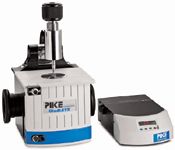
Glow discharge OES system
The GD-Profiler 2 RF glow discharge optical emission spectroscopy system from Horiba Scientific is designed to provide ultrafast elemental bulk, surface, and depth profile analysis. According to the company, the system utilizes controlled sputtering of a material by a 4-mm diameter plasma, analyzing all elements including gases (N, O, H, Cl) as a function of the depth in conductive or nonconductive layers and substrates. Samples of varying sizes and shapes can be measured. Horiba Scientific, Edison, NJ;
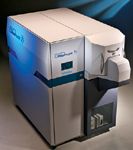
X-ray source
Moxtek's 50-kV monoblock X-ray source is designed for applications including handheld, portable, and benchtop instrumentation. According to the company, the source is a battery-operated, lowpower device that uses passive air cooling and delivers a high intensity flux of approximately 2 × 1011 photons/s/steradian/0.10 µA. The source reportedly weighs ~350 g and provides a variable energy output up to 50 kV, a maximum beam current of 0.20 mA, and a total power of up to 4 W. Moxtek, Orem, UT;
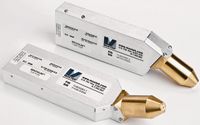
Longpass filters
Optometrics' longpass filters are designed for applications in Raman spectroscopy and fluorescence. According to the company, the filters have 6.0 optical density with transmissions of >90% (average) on either fused silica or white crown glass. Optometrics Corporation, Ayer, MA;
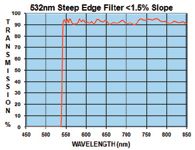
Silicon drift detectors
Amptek's Super silicon drift detectors are designed for XRF applications with OEM handheld instruments and benchtop analyzers. According to the company, the detectors have 125-eV FWHM resolution, an 11.2-µs peaking time, and a P/B of 8200 with an area of 25 mm2 and a silicon thickness of 500 µm. The detectors reportedly are contained inside the same TO-8 package and do not require liquid nitrogen. Amptek Inc., Bedford, MA;
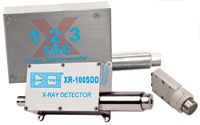
EDXRF spectrometer
Rigaku's benchtop energy dispersive X-ray fluorescence (EDXRF) spectrometer is designed to work as a compact elemental analyzer, delivering rapid quantitative determination of sodium to uranium in solids, liquids, powders, and alloys. According to the company, the spectrometer features an "icondriven" touch-screen interface, along with a built-in printer. Options include fundamental parameters, an automatic sample changer, a sample spinner, and helium purge for enhanced light element sensitivity. Applied Rigaku Technologies, Austin, TX;
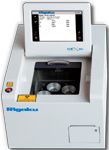
Spectra library
Fiveash Data Management's FDM Raman Organics is a library of 500 Raman spectra of model organic compounds. According to the company, the spectra in the library were run in-focus on a 6-cm-1 , whitelight- corrected spectrometer with a 780-nm laser, SNR of 500, and a range of 200–3200 cm-1 . The library reportedly is available in most spectral library formats. Fiveash Data Management, Madison, WI;
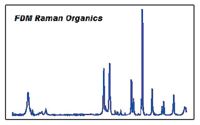
UV–vis spectrophometer
Agilent's Cary 60 UV–vis spectrophotometer is designed with fiber-optics capabilities that allow for remote sampling ranging from bulk solutions to cold biological samples. According to the company, the spectrophotometer's lamp typically lasts 10 years. The instrument reportedly includes local language software and tutorials and has a scan rate of up to 24,000 nm/min. Agilent Technologies, Santa Clara, CA;
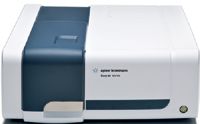
IR spectrometer
The 4100 ExoScan mid-IR spectrometer from Agilent is a one-module, 6.5-lb system for use in the laboratory or onsite. According to the company, the handheld system features a choice of interchangeable sampling interfaces and allows users to choose diffuse, grazing angle, specular reflection, or spherical ATR sampling interfaces. Applications include infrared absorbing and scattering surfaces, reflective metal surfaces with coatings and films, and bulk materials such as powders and granules. Agilent Technologies, Santa Clara, CA;
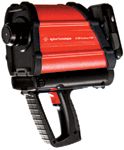
Grinding mill
The Cyclone Mill Twister from Retsch is designed to process small sample volumes of food, feed, and forage for NIR analysis. According to the company, the product's grinding chamber and rotor design generate a jet of air that draws the sample into a collection bottle and reduces localized heat build-up. The product reportedly grinds samples to 500 µm while preserving the integrity of the sample. Retsch Inc., Newtown, PA;
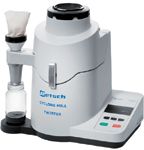
Consumer safety compliance standards
SPEX CertiPrep USP-TXM1 certified reference material is based on USP's proposed limits on the elemental impurities in pharmaceutical products. According to the company, the certified reference material can be used "as is" as a calibration or check standard to verify oral daily dose PDE, or diluted as needed to verify parenteral component limit or parenteral daily dose. Spex CertiPrep, Metuchen, NJ;
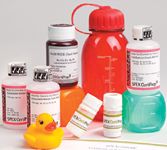
DNA quality control standard
Starna's DNA quality control standard is provided in a 1.5-mL liquid vial that offers the DNACON 260/280 reference material in format suitable for use in drop technology systems. The vial reportedly is produced in an ISO 17025 and ISO Guide 34 accredited environment and provides a NIST-traceable quality control standard. According to the company, the concentration is matched for use with ultralow volume and short-pathlength measurement systems. Applications include DNA purity evaluations in clinical and bioscience laboratories. Starna Cells, Inc., Atascadero, CA;
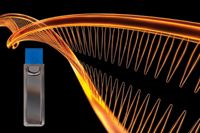
Crystallographic database
Release 2011 of the Powder Diffraction File from ICDD contains 715,953 unique material data sets. According to the company, each data set contains diffraction, crystallographic, and bibliographic data, as well as experimental, instrument, and sampling conditions, and select physical properties in a common standardized format. International Centre for Diffraction Data, Newtown Square, PA;
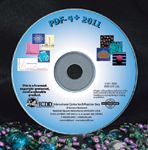
Calibration standards
HellmaUSA, a calibration laboratory that produces and certifies liquid and gas calibration filters for testing spectrophotometers, was accredited according to DIN EN ISO 17025. According to the company, the DIN EN ISO 17025 ensures the traceability of calibrations to references of the National Institute of Standards and Technology, which gives laboratories greater transparency and improved protection over measurement results. HellmaUSA, Plainview, NY;
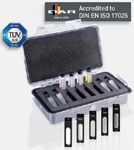
Dispersive Raman spectrometer
The RamSpec-HR-1064 dispersive Raman spectrometer from BaySpec is designed with a spectral range of 200–3200 cm-1 , a high-power narrowband 1064-nm laser, and a high-throughput VPG grating-based spectrograph with the company's deep-cooled InGaAs detector array. The spectrometer reportedly supports multichannel input ports and features a high-temperature extended-length reaction monitoring probes. BaySpec, Inc., San Jose, CA;
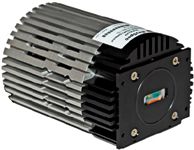
Raman system
The LabRam HR Raman system from Horiba Scientific is available with an ultra-low-frequency (ULF) that enables measurements of Raman spectra with shifts as low as 5 cm-1 relative to the exciting laser line. According to the company, the system can be used to determine chain lengths in polymers and differentiate similar crystal forms (polymorphs) in pharmaceutical products, among other applications. Horiba Scientific, Edison, NJ;
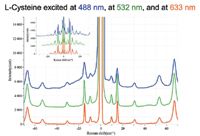
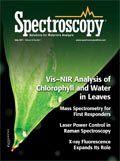
New Study Reveals Insights into Phenol’s Behavior in Ice
April 16th 2025A new study published in Spectrochimica Acta Part A by Dominik Heger and colleagues at Masaryk University reveals that phenol's photophysical properties change significantly when frozen, potentially enabling its breakdown by sunlight in icy environments.